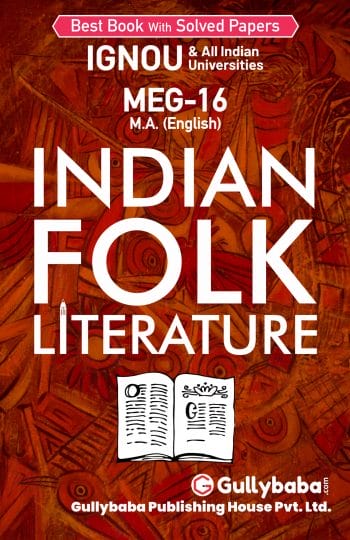#1 Best Selling IGNOU MEG-16 Help-Book & Study-Guide in IGNOU Marketplaces.
Get Good Marks in your MA English Programme in the Term-End Exams even if you are busy in your job or profession.
We've sold over 58,649,645 Help Books and Delivered 73,610,614 Assignments Since 2002.
As our customers will tell you...yes, it really result-oriented.
IGNOU MEG-16 Code Details
-
University
IGNOU (Indira Gandhi National Open University)
-
Title
Indian Folk Literature in English Translation
-
Language(s)
English
-
Code
MEG-16
-
Subject
English
-
Degree(s)
MA
-
Course
Optional Courses
IGNOU MEG-16 English Topics Covered
Block 1 - Folk Literature and Language: Research and Pedagogy
- Unit 1 - An Introduction to Folklore
- Unit 2 - Thematic & Narrative Concerns of Indian Folk Literature
- Unit 3 - Indian Folklore: Forms, Patterns and Variations
- Unit 4 - Theoretical Approaches to Folklore
Block 2 - Identity and Hybridity: Kshetra and Desha
- Unit 1 - Folk Language as a Repository of Culture
- Unit 2 - Folklore as an Expression of Existence
- Unit 3 - Folk Paintings: Visual Narratives
Block 3 - Folk Literature: Sources, Characteristics, Classifications and Functions
- Unit 1 - Folk Narrative Poems and Folk Songs
- Unit 2 - Myths, Legends and Tales
- Unit 3 - Proverbs, Riddles and Speech
- Unit 4 - Archiving and Documentation
- Unit 5 - Adaptation and Interpretation of Folk Literature in Modern Times
Block 4 - Folktales of India: Motifs, Modes and Mores
- Unit 1 - Folktales from India by A.K. Ramanujan
- Unit 2 - When the World was Young by Verrier Elwin
- Unit 3 - Myths of Middle India by Verrier Elwin
- Unit 4 - Manoj Das's Tales Told by Mystics and The Lady Who Died One and A Half Times and Other Fantasies
- Unit 5 - The Legends of Pensam by Mamang Dai
Block 5 - Folk Poetry
- Unit 1 - Oral Epics in India by Stuart H. Blackburn
- Unit 2 - The Awakened Wind: The Oral Poetry of the Indian Tribes by Sitakant Mahapatra
- Unit 3 - Ramayana in Modern South India Ed. Paula Richman
Block 6 - Folk in Contemporary Indian Fiction
- Unit 1 - Pather Panchali by Bibhuti Bhusan Bandopadhyay
- Unit 2 - The Folk Culture of Odisha: Gopinath Mohanty's Paraja
- Unit 3 - Maila Anchal by Phanishwar Nath Renu
- Unit 4 - The Dilemma by Vijaydan Detha
- Unit 5 - Chemmeen by Thakazhi Sivasankara Pillai
- Unit 6 - Kanthapura by Raja Rao
Block 7 - Folk Theatre
- Unit 1 - Appropriation of Folk in Indian Theatre: Jatra, Kathakali, Tamasha, Nautanki and Pala
- Unit 2 - Folk, Popular and Film
- Unit 3 - Girish Karnad’s Hayavadana and Naga-Mandala
- Unit 4 - Habib Tanvir’s Charandas Chor
IGNOU MEG-16 (July 2024 - January 2025) Assignment Questions
1. Give a brief overview of the growth of folklore studies in India.
2. What is Contextual Theory of folklore? Elucidate.
3. Categorize the ‘Great’ and ‘Little’ traditions in the study of folklore.
4. Are cave paintings a part of our folk paintings and folk narratives? Attempt a critical review of folk paintings.
5. Tales Told by Mystics bases itself on the rich indigenous mythological properties. Discuss.
6. Attempt a critical note on the ethnographic details and eco-systems of the tribes of India on the basis of Sitakant Mahapatra’s The Awakened Wind: The Oral Poetry of the Indian Tribes.
7. Discuss Girish Karnad’s pivotal role in the development of folk theatre and modern Indian drama.
8. Write short notes on any two:
a. Desha,Kshetra,Nadu,Rajya
b. Jatra, Kathakali, Tamasha
c. Folk music
d. Folk cuisine
IGNOU MEG-16 (July 2023 - January 2024) Assignment Questions
1. Give your views on the oral epics of India and justify your points with reference to the oral epics in your syllabi.
2. Critically appreciate the text, ‘Ramayana in Modern South India’, edited by Paula Richman.
3. Write short notes on the following:
a) Folk Culture of Odisha
b) Maila Anchal
c) The Dilemma
d) Chemmeen
4. How does Raja Rao’s ‘Kanthanpura’ reflect the Gandhian Concerns?
5. What are the different elements that influence folk, popular and film and make them a part of our culture?
6. Discuss Girish Karnad’s engagements with myth, history and folktale.
Buy MEG-16 Assignment
